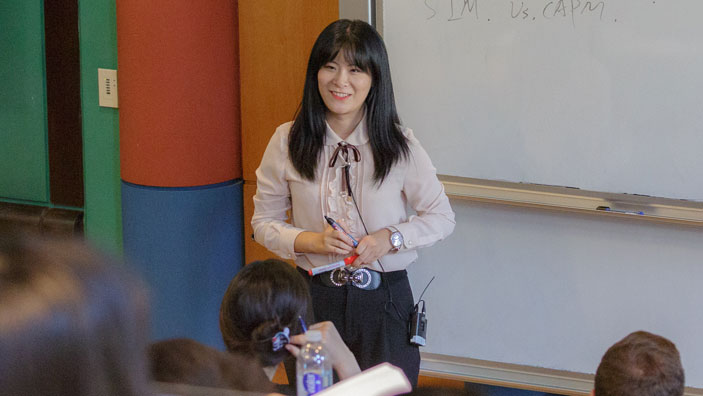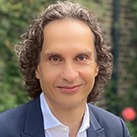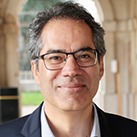Overview
Stream B starts with the MPhil in Innovation, Strategy and Organisation or a Master of Research: an interdisciplinary foundation that exposes students to important organisational and strategy theories and studies.
We draw upon a range of social sciences including sociology, economics, political science, anthropology and philosophy to understand issues which are of importance to senior managers as well as to a broad range of stakeholders in a firm’s environment.
Stream B primarily employs an interpretive approach to understand strategy. This means that we look at strategy not simply as an outcome of a rational planning process, or as the primary explanation for firm success or failure, but also as a sociological phenomenon in its own right. You are encouraged to study interesting empirical sites and break new theoretical ground in phenomena related directly or indirectly to strategy.
This stream employs both rigorous qualitative and mixed methods to understand strategic management in organisations – for-profit business, NGOs, not-for-profits, state enterprises and hybrids. These might include grounded theory, case studies, ethnography discourse analysis, and other methodological techniques.

The pathway
To start on the Strategic Management (Stream B) pathway you must take one of the following 9-month masters programmes:
Essential reading
The Strategic Management (Stream B) PhD pathway
Download detailed information about the 9-month + 4-year programme structure and content.
Research areas
Research focus is on the factors that govern the formation and evolution of strategies at the group, functional, business, corporate, and field levels of analysis. A variety of rigorous research design approaches are utilised, including in-depth case studies, participant observation, ethnographies, discourse analysis and mixed methods – combining these methods.
Research streams
Research streams encompass a broad range of phenomena, including:
- strategic decision-making
- strategy implementation
- strategic change
- the role of chance events consensus
- politics and power in strategy-making
- the role of organisational actors in strategy-making
- a variety of field or industry level phenomena such as the emergence of markets, institutions and understandings.
Faculty areas of research interest
- How do managers go about their jobs?
- How do they understand their industries or institutional fields?
- Why do they adopt particular strategic tools, deploy technologies, decide to engage in mergers or acquisitions, ritualise organisational processes beyond their functional use, or assume certain identities in order to fit particular categories are all questions of interest to us (among numerous others)?
- What is the role of digital media and new technologies in the evolution of organisations and industries?
- How is competitive advantage developed on the back of new technologies?
- How can we define and analyse performance and value creation in business?
- In particular in organisations (eg not-for-profit organisations, creative and arts organisations) where multiple and sometimes, contradictory performance indicators co-exist?
- What is the role of organisations in addressing fundamental global social challenges of poverty, climate change, health inequalities and chronic disease?
- How is inequality created and/or institutionalised in organisations and fields?
- How do institutional entrepreneurs create new markets and legitimise new technologies, products or services?
- How does power operate in markets and industries?
- How do industry structures arise? What role do institutional entrepreneurs play in this?
- How do new markets emerge, especially those which require significant shifts in meaning?
- How do new categories (eg impact investing) arise? How do these impact firm level strategies?
- What distinguishes businesses in emerging markets from those in developed markets?
- Specifically in terms of organisation, diversification, expansion etc?
- How do firms attempting to satisfy a plurality of stakeholder interests compete and/or cooperate effectively with like-minded firms as well as with traditional competitors?
What we expect from you
Prepare to join a highly selective and globally diverse pathway. You will need to have a first class bachelors degree or equivalent. In some cases you will need to have a masters degree from a highly regarded university and to have performed within the top 5% of your class. We welcome outstanding applicants with degrees from a variety of disciplines, including business, sociology, psychology, anthropology, economics, engineering, the physical sciences and humanities. See the MPhil in Innovation, Strategy and Organisation (ISO) or Master of Research (MRes) academic requirements for more details.
You will demonstrate a high level of commitment to an academic career in a business school as well as a desire to engage with external organisations. We will need to see evidence of excellent writing skills. Practical management experience is welcome but not essential.
For more details, please see the academic requirements for the:
What you can expect from us
Get the preparation you need to conduct independent, high-calibre qualitative or mixed methods research in strategic management and pursue an academic career as a faculty member at a major university. Previous students are now faculty at a range of universities including London Business School and HEC (Montreal).
- Benefit from rigorous academic training via an integrated and coherent programme of study that includes intensive seminars and workshops.
- Understand the latest qualitative research methods and emerging thinking in strategic management.
- Receive funds to attend cutting-edge and highly specialised qualitative or mixed research methods workshops offered by renowned scholars at other institutions.
- Work with the faculty on joint research projects for presentation at top international conferences and for publication in leading academic journals.
- Faculty members maintain research collaborations with students long after they have graduated.
- Interact closely with outstanding fellow PhD students who represent a wide variety of professional backgrounds, nationalities and ethnicities.
- Connect and collaborate with leading strategy scholars from around the world through our active research seminars and renowned visiting scholar programmes.
- Get school support to spend part of your PhD time at a strategic management department at another top school. Our students have spent time at renowned institutions such as MIT, UC Berkeley, Columbia, Wharton, Darden and Michigan as a part of the PhD programme.
- Experience our hallmark high standards of academic rigour and strong practical relevance to the business world.
- Get our assistance in engaging with organisations directly to gain access to unique data and rich insights on key strategy problems they face.
- You will have access to comprehensive research databases, the latest software and computer equipment and a fully equipped behavioural lab.
PhD supervisors
Your principal supervisor will be a senior academic, often a Professor or Associate Professor, from within the Strategy and International Business subject group. You will benefit from their guidance and counsel throughout the programme, and beyond: in helping you to succeed in the job market and in gaining a faculty position at a leading business school. Your principal supervisor will take an active role in your research programme and will assemble a group of faculty (your advisory committee) who will co-author papers with you.
Take a look at the faculty who may serve as your principal supervisor and view their research interests:
Shahzad (Shaz) Ansari
Professor of Strategy and Innovation
Research interests
Shaz Ansari researches frames and framing; technological and management innovations; platforms, value creation and new markets; social and environmental issues in management; grand challenges; temporality; commons; reputation; identity; institutional processes and diffusion of practices.
Allègre Hadida
Associate Professor in Strategy
Research interests
Allègre Hadida researches strategy and decision-making in volatile environments, with a particular interest in creative, arts and media industries and organisations. Other research interests include: temporary and project-based organisations; integration of new technologies, including digital content production and broadcast, in traditional arts organisations; roles and resources in cinema; gender and racial labour discrimination; creativity and improvisation in business.
Kamal Munir
Professor of Strategy and Policy
Not available to take incoming PhD students in October 2026
Research interests
Kamal Munir researches social and institutional change and stability; technological shifts in society; emergence of new markets; socio-economic changes in South Asia and Africa; economic development and competitiveness of developing countries.
Lionel Paolella
Professor of the Social Sciences and Organisations
Research interests
Lionel Paolella researches strategy and economic sociology; organisation theory; categorisation; social evaluation; gender diversity. Lionel’s main line of research explores how market categories – a set of firms that share cognitive and cultural similarities – affect the social evaluation, the innovation and performance of organisations. He mainly uses quantitative methods.
PhD advisory team
Dr Madeleine Rauch supervises MPhil individual research projects and MPhil dissertations, and is available to join a PhD advisory team.
Strategy and International Business faculty
Learn more about the faculty that teach on this pathway.
Learn more about the Strategy and International Business subject group





